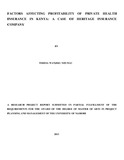| dc.description.abstract | For many years, health insurance business has reflected poor performance and sometimes heavy
losses. Some of the factors that have continued to contribute to the poor performance include
poor pricing patterns, poor underwriting practices, high cost of healthcare services, fraud, weak
regulatory framework, inadequate information management systems among others. According to
industry stakeholders, the losses being incurred by companies offering health insurance is on a
steady rise and far outstretches globally accepted levels. This purpose of the study was to analyze
factors affecting profitability of private health insurance. The objectives of the study included: to
investigate the extent to which pricing patterns affect profitability of Heritage health division,
establish the extent to which the health underwriting practices affect profitability of Heritage
health division, investigate the extent to which health insurance fraud affects profitability of
Heritage .health division and to establish the extent to which the health regulatory framework
affects profitability of Heritage health division. The study applied a case study research design
and took a holistic approach on Heritage health division. The respondents were the managers of
Heritage Insurance Company. The data collection instruments that were used were semi-structured
questionnaires and they were complemented with interviews. Analysis of the data was
done using descriptive statistics and linear regression. The findings revealed that all the
independent variables had a positive correlation with the dependent variable health regulatory
framework having the highest correlation of 0.780 followed by pricing patterns with a correlation
of 0.737 and then health underwriting practices with a correlation of 0.656. Fraud had the least
correlation of 0.616. The research established with a 99% confidence that all the independent
variables significantly affect profitability of Heritage health division. The study established that
the regulatory framework and pricing patterns had the greatest effect on profitability of Heritage
health division. It also established that the underwriting practices had a significant influence
while fraud had the least effect on profitability on Heritage health division as Heritage had
effective ways of mitigating fraud. The study recommends that when pricing the health insurance
covers, the management should be considerate to the regulatory, economic and social
environment. Through this they can achieve a competitive edge through balancing in order to
make the prices attractive to new clients as well as the.existing clientele. | en |

